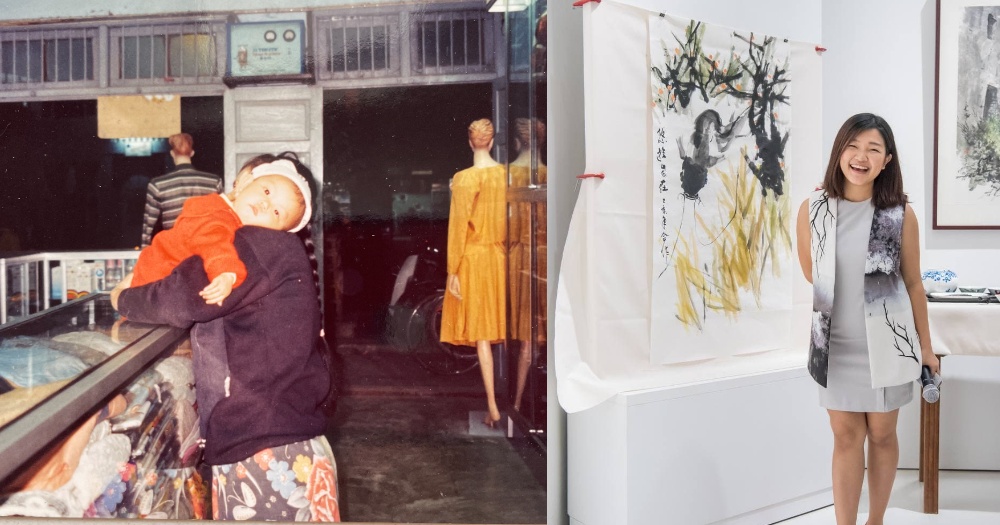Follow us on Telegram for the latest updates: https://t.me/mothershipsg
Most of us living in Singapore probably wouldn't blink twice at being able to drink water straight from the tap.
However, for 26-year-old Ivy Zhang, this was an almost revolutionary change to her life when she first arrived here with her family in 2009, given how they'd had to drill into the ground to obtain clean water back in Myanmar.
Zhang initially felt overwhelmed by the change in lifestyle in Singapore and an unfamiliar education system — all while struggling to understand Singlish. But she quickly overcame her difficulties, and forged a new life in Singapore.
Today, having lived here for over 10 years, she hopes to be able to settle down permanently in Singapore, and one day be recognised as a "true blue Singaporean".
She hung out with the "Crazy Rich Asians" of Myanmar
Zhang, who is also known as May Mann Oo in Myanmar, was born in Mandalay to Chinese parents.
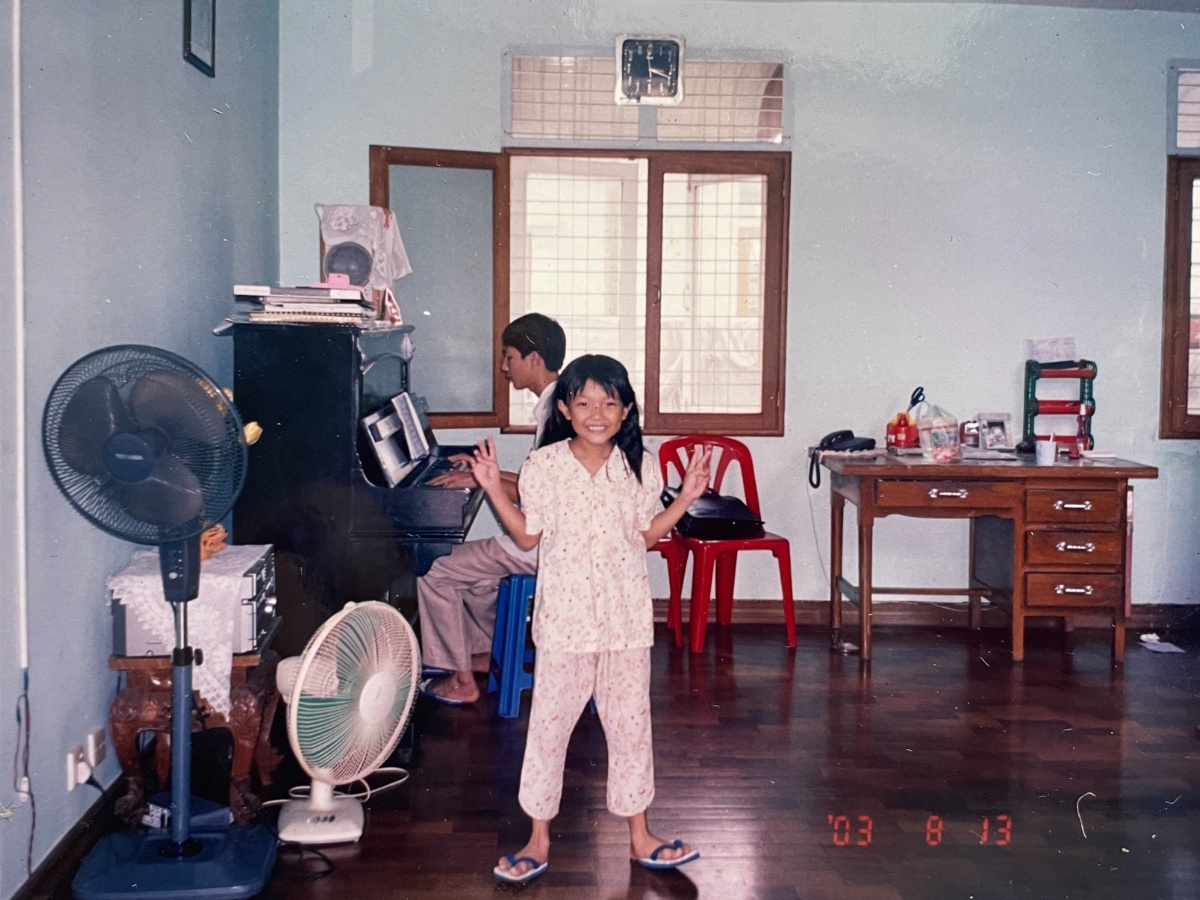 An image of Zhang's home, which was taken in 2003. Image via Ivy Zhang.
An image of Zhang's home, which was taken in 2003. Image via Ivy Zhang.
She described her early life in Myanmar as spartan, given how underdeveloped the country was at the time.
Households in her area only had access to electricity for eight hours a day, made worse by the fact that they had no idea which eight hours in the day the electricity would be running.
Fortunately for her, she was eventually able to attend an American international school, something that she acknowledged was "very privileged".
That was when she began interacting with some of the richest people in the country, whom she described as the "Crazy Rich Asians" of Myanmar.
They lived in huge complexes, with multiple mansions for each branch of their extended families, complete with modern amenities such as swimming pools, gyms and private theatres.
This was in stark contrast to Zhang's own home, which was middle-class at best and was devoid of all these first-world luxuries.
In fact, Zhang recalls seeing an actual gold-plated room in her friend's house, as if the aforementioned displays of wealth were not ostentatious enough already.
She would often see them whip out stacks of cash to pay for drinks, without asking for any change.
This, Zhang said, also had to do with the fact that credit cards were not common in Myanmar back then — even among the wealthy — as the people had a deep-rooted mistrust of banks.
Yet, these classmates were not necessarily the obnoxious rich kids that one might imagine them to be, and Zhang personally finds it difficult to find fault with how detached they were from the reality of Myanmar.
"They were actually super nice, which makes it even more difficult to be annoyed at them," she said. "They just don't understand. When they live in so much wealth, anything less than that doesn't make sense to them".
Zhang said that they were always extremely generous, often offering to pay for her meals and instructing their chauffeurs to send her home.
When pressed for her thoughts on the recent military coup, Zhang declined to comment much on the situation, aware of the sensitivity of the issue.
However, she did share that she and her family have been sending money back to Myanmar, with instructions for their family members there to buy food and necessities for those in need, amid the political turmoil.
"It's very sad, but this is what we can do," she said.
Moved to Singapore in 2009
Unlike the rich friends Zhang hung out with, she herself was far from affluent; her parents owned a small business, and channeled much of their profits toward paying for her school fees every month.
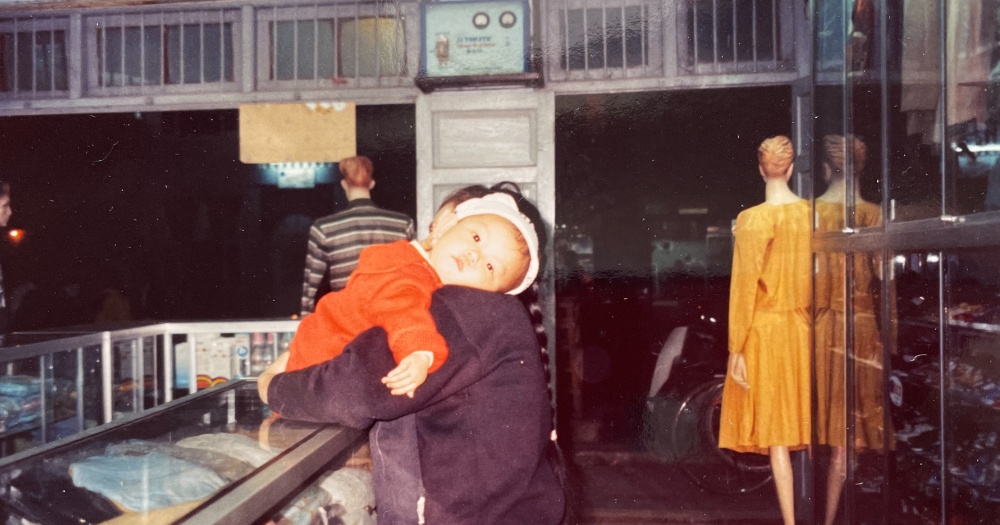 Her parents owned a small shoe business in Myanmar. Image via Ivy Zhang.
Her parents owned a small shoe business in Myanmar. Image via Ivy Zhang.
Her parents made frequent sacrifices, such as selling their car and downsizing their house, as they saw the value in getting a good education for their children.
Unfortunately, as her school fees began to increase by almost 25 per cent every year, it became increasingly less feasible for Zhang to continue studying in her international school.
Her parents also felt that the quality of the education she was getting in her school was not worth the amount they were paying, especially since school fees had to be paid in US dollars — a rare commodity for a middle-class family.
As a result, in 2009, Zhang's family decided to move to Singapore, joining Zhang's sister, who moved to Singapore earlier to pursue her own education.
A whole new world
For Zhang, arriving in Singapore was akin to entering a whole new world.
She was incredibly amazed by things that many Singaporeans probably take for granted.
For example, she would often switch lights on randomly, just to marvel at the fact that electricity is available the entire day.
Zhang was also pleasantly surprised by the fact that tap water in Singapore is safe to drink.
She said that in Myanmar, the water that flowed out of taps was often dirty, and families would only use it to wash clothes, or clean the floor.
When I asked her whether she drinks water from the tap here, she replied with a resounding yes.
"You would never, never do that in Myanmar," she said. "You do that, and you might actually die".
Zhang later clarified that this might have been an exaggeration, but her excitement towards something as basic as clean water fascinated me.
In fact, Zhang didn't take something as simple as going to school alone for granted, as her parents initially insisted on accompanying her to school, even though she was already a teenager.
"I think they still have the mindset of being in Myanmar, where they found it very dangerous to even go to school," she said.
She recalled an incident back in Myanmar. Her family and her were heading home when they noticed a person lying face-down on the street, with blood all over him.
It looked like a traffic accident, and the family initially assumed that the police would arrive soon to take care of him.
Instead, four hours later, when the family drove down the same street, the man's body was still lying there, with no law enforcement in sight.
Till today, Zhang has no clue what happened to the man.
Another thing that Zhang loved about Singapore when she arrived: 24-hour McDonald's.
There were no McDonald's outlets in Myanmar at the time, Zhang explained, saying that when she was finally allowed to travel alone, she would wake up early, and set off on the first train, stopping at McDonald's on the way to school, just to get a chance to eat her favourite hashbrowns.
Sometimes, one needs to appreciate the small joys in life, I thought to myself.
Adapting to tests and exams in Singapore
While 24-hour access to McDonald's was great, it wasn't easy for Zhang to adapt to her new school life in Singapore.
She was fluent in English, thanks to her time in an American international school, but the rigour of Singapore's secondary education system was something she wasn't quite prepared for.
She said that the American system prioritised project-based learning, so Singapore's emphasis on tests and exams were a rude shock to her.
"I think the system is very different. It's like, if you don't write in a certain way, you're very, very heavily penalised. And that was not how I was taught growing up."
Zhang described having to cram four years of syllabus in only two years, with a much weaker foundation in science and math compared to her peers.
She recalled failing most of her subjects in her first year, with the exception of English and Chinese, and found literature particularly challenging, given how she had zero background knowledge prior to this.
Her strong American accent at the time also made fitting in at school quite difficult, as she encountered people who would mock her for being an Asian with an American accent.
She also had trouble understanding Singlish, and said that her peers often spoke too quickly for her to catch up.
She recalled a particular instance where her English teacher asked her to read out a comprehension in class, and praised her for her accurate pronunciation.
She soon learnt that getting praised in secondary school was not always a good thing, as some of her classmates began making fun of her accent in front of her.
"It's never a nice thing to be validated in your class, especially in secondary school," she said.
Despite her many challenges, Zhang persevered through her studies, eventually doing well enough to enter Catholic Junior College, and went on to secure a place at the National University of Singapore (NUS), where she graduated with a degree in Communications and New Media.
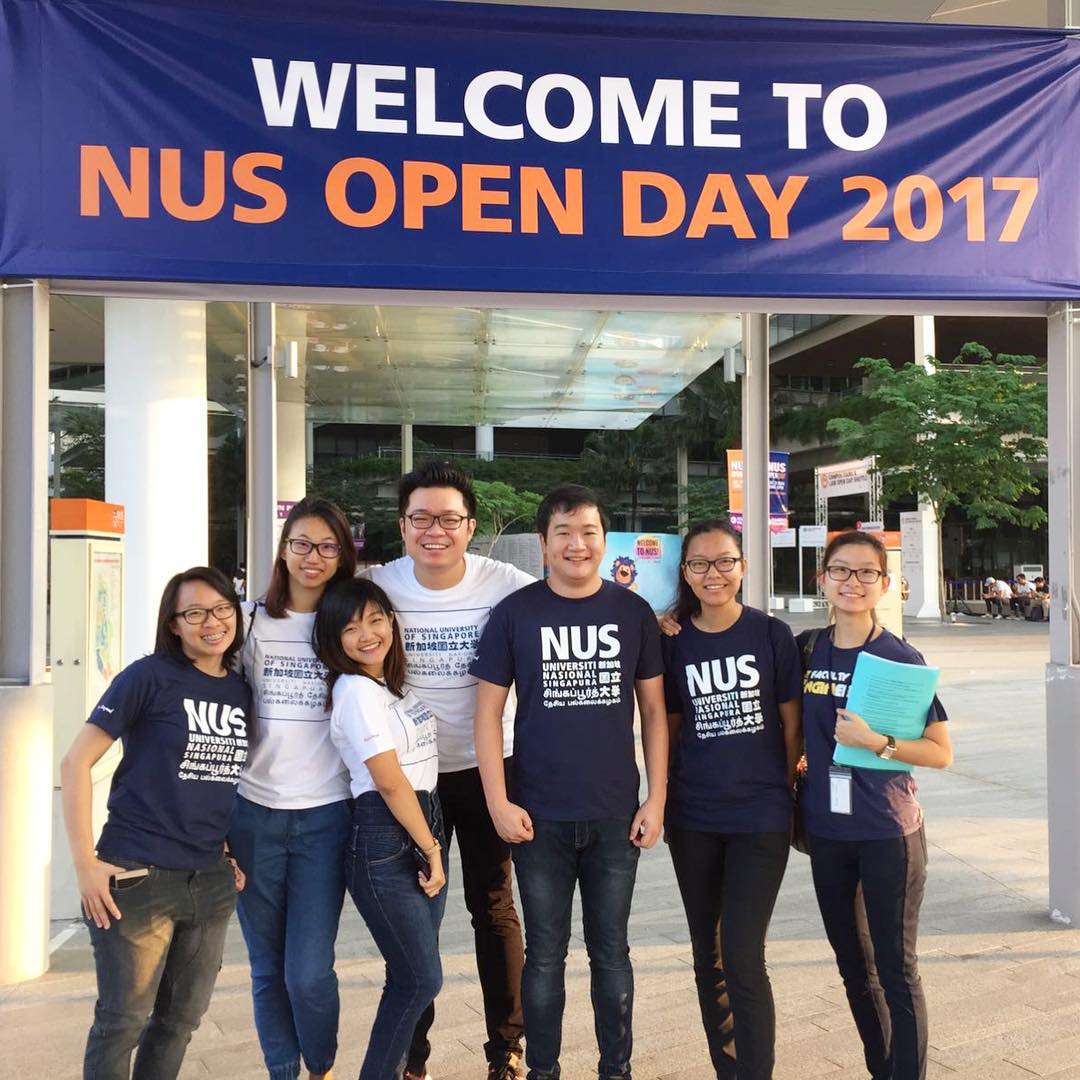 Zhang at NUS Open Day in 2017. Photo via @ooits_ivy on Instagram.
Zhang at NUS Open Day in 2017. Photo via @ooits_ivy on Instagram.
People in Myanmar were genuinely helpful
Although Zhang has been here for more than a decade, she occasionally misses Myanmar, especially the people.
While many people in Myanmar may be poor, Zhang said that they are often "a lot more genuine", and have a heart of gold.
She said that when she was taking public transport as a young child, her fellow commuters will never fail to give up their seats for her, even without being asked.
Zhang said that for many locals in Myanmar, it's easy to form connections, given that people instinctively helped each other out.
"Many people in Myanmar, if they see you're struggling with something, even if it's something small, they will help you. They won't let the whole world know that they help you, but they will do it anyway."
People in Singapore are less proactive
In Singapore, however, Zhang finds that locals are often less proactive with helping others, although they are more than willing to do so if you approach them for help.
Describing this as a "big city problem", she said that it's often necessary to get to know a Singaporean first, before they become more friendly.
What Singaporeans possibly lack in warmth, however, is made up in spades by their efficiency and work ethic.
She described having lived through a cyclone back in Myanmar in 2004, which left her house without a roof, and her family living in the basement without electricity for weeks.
And while the family was desperate to get back to normalcy as soon as possible, this was not a sentiment shared by the workers who were engaged to repair their roof. They basically took their time with it.
"They were really lazy. They would come in late, and then they will work for a while, then go for a two-hour lunch. It was an excruciating process," she said.
Although she emphasised that not everyone in Myanmar shares the same work ethic (or lack of it), she said that such an experience is not an uncommon one.
For Zhang, this is very different from Singaporeans, whom she felt are generally very hardworking and extremely goal-oriented.
In fact, she said that Singaporeans are often so diligent, they seem to "not be interested in work-life balance".
To be honest, I can't really argue with that assessment.
There are modern shopping malls in Myanmar now
While the Myanmar Zhang remembers is very distinct from Singapore, the disparity has started to shrink in recent years.
She described heading back to Myanmar to visit friends and family, only to be shocked that the malls resembled those in Singapore.
One mall in particular resembled ION Orchard, with shops like Singapore's very own BreadTalk taking root there.
 Shopping malls are now more common in Yangon. Image via Ivy Zhang.
Shopping malls are now more common in Yangon. Image via Ivy Zhang.
Many global chains have also popped up in Myanmar, a mark of impressive progress, given that the country lacked a McDonald's just years ago.
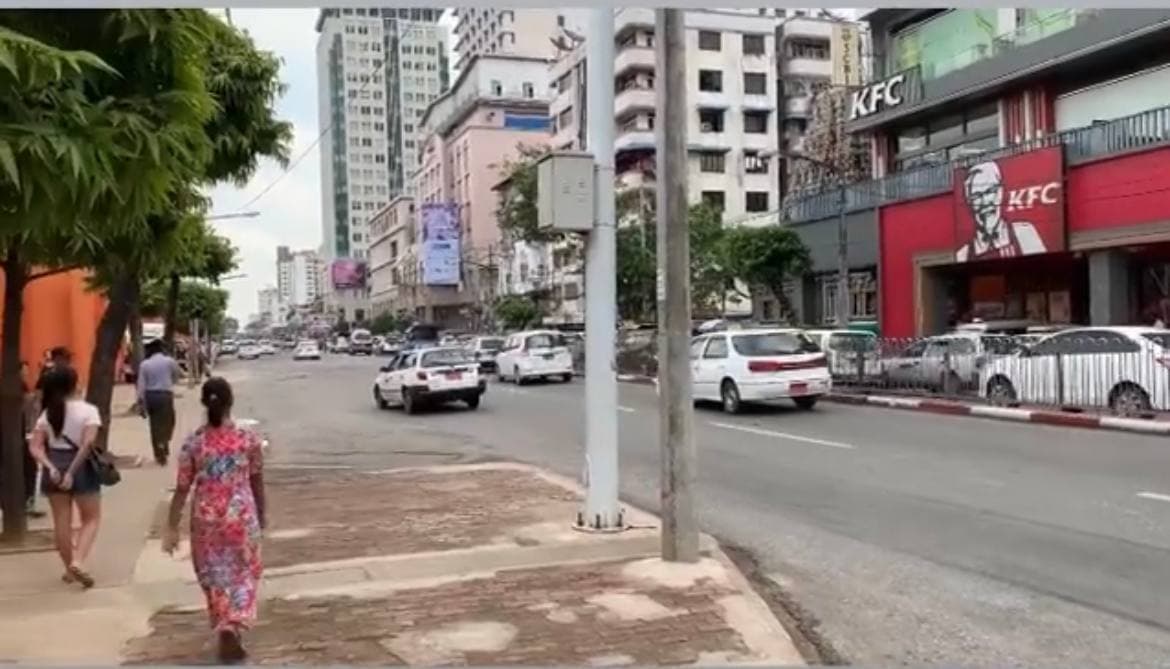 Previously, brands like KFC did not exist in Myanmar. Image via Ivy Zhang.
Previously, brands like KFC did not exist in Myanmar. Image via Ivy Zhang.
She hopes to settle down in Singapore
Currently, Zhang keeps herself busy, working as a part-time emcee, while holding a full-time job in a tech start-up.
https://www.instagram.com/p/CLo9l9vjB9R/
When I asked Zhang about her future plans, she said that she wants to settle down permanently in Singapore, and that she is in the process of applying to be a citizen.
She said that when she was growing up in Myanmar, she never really felt that she belonged, given that she was an ethnic Chinese among the Burmese, and that she was not rich, unlike many of her classmates.
However, despite being well-integrated into Singaporean society, she still has some lingering doubts about whether she would truly be accepted in Singapore, due to her heritage.
She said that she has considered changing her Burmese name officially, in order to better fit into Singapore society, although she described the process as "complicated", given that she needs to procure many documents to do so.
As she explained the administrative hurdles she faced, I sensed that she was also afraid of facing potential repercussions simply because she stands out, simply by virtue of her heritage and lived experiences.
However, I also began to realise, as the interview went on, that she was no longer speaking in her natural American accent; instead, she was slowly speaking more and more Singlish as we conversed, dotting her sentences with lah and leh naturally.
Despite having trouble understanding Singlish when she first arrived in Singapore, she has clearly grown more familiar with it during her many years here.
While I'm not sure what exactly qualifies someone as a "true blue Singaporean", I do know this: if you can speak Singlish this well, you can't be all that foreign.
Stories of Us is a series about ordinary people in Singapore and the unique ways they’re living their lives. Be it breaking away from conventions, pursuing an atypical passion, or the struggles they are facing, these stories remind us both of our individual uniqueness and our collective humanity.
Top image via Ivy Zhang
If you like what you read, follow us on Facebook, Instagram, Twitter and Telegram to get the latest updates.
